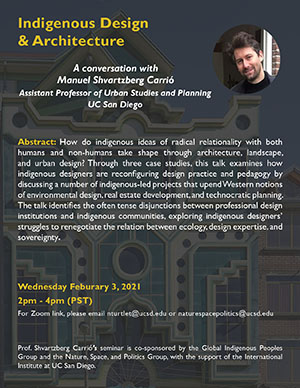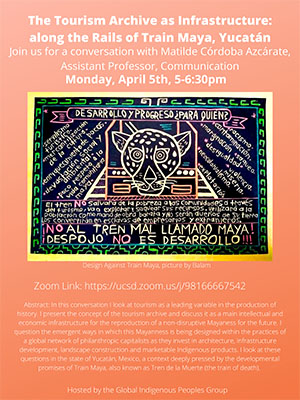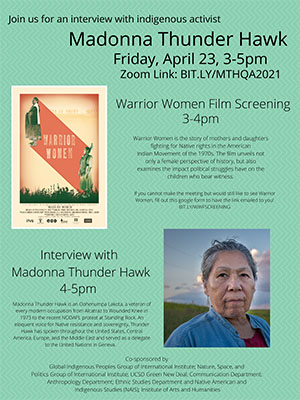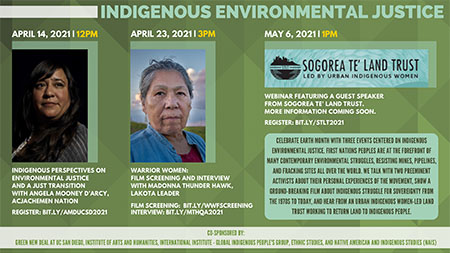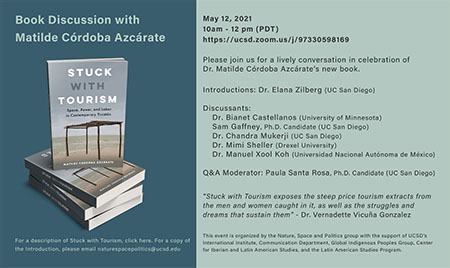2020-2021 Meetings and Events
Indigenous Development
Drawing on our group's involvement in the Routledge Handbook on Indigenous Development, we have used our meetings this year to ask what development means to Indigenous peoples across the world. While development has historically functioned to dispossess and assimilate Indigenous communities into 'modern' societies, our aim has been to challenge these epistemologies of development and recenter Indigenous knowledges and practices. Many contributors to the volume gave presentations on the perspectives of Indigenous communities to development, looking both at histories of colonialism as well as toward hopes for Indigenous futures.
Indigenous Peoples Day
October 12, 2020
Our group members participated in the online screening of two documentaries, Dawnland and Dear Georgina, produced by the Upstander Project.
Annual Kick-Off
November 9, 2020
For our first meeting of the year, new members Keolu Fox (Anthropology) and Manuel Shvartzberg Carrió (Urban Planning) introduced themselves and their work and we had a discussion of the films we viewed individually on Indigenous Peoples Day, Dawnland and Dear Georgina.
Acts of Protection
November 30, 2020
Cameron Grimm, PhD Candidate, Political Science, University of Hawai’i at Manoa
This talk was co-sponsored talk with the Environmental Justice Series
Abstract of the Presentation: Resistance is one way to articulate opposition to development projects, but many indigenous communities frame their opposition in stronger, more positive terms, calling themselves protectors of the earth. For instance, in 2019 the State of Hawaii and Thirty-meter Telescope (TMT) announced they would begin construction on Mauna Kea volcano. Local community members responded by blocking the access road and establishing Puʻuhonua o Puʻuhuluhulu, a space of refuge where they have access to food, medical supplies, education, and cultural practices while protecting Mauna Kea from further desecration. In the struggle to stop the construction of TMT, the ‘protestors’ refused the discourse of protest and instead called themselves kiaʻi, protectors of Mauna Kea. This chapter reveals how resistance and protest, as state-centric terms, articulates a relationship of dependency which assumes the occupation of Hawaiʻi as a foreclosed process—imposing an imaginary blockade on Hawaiian futurities. With the idea of a foreclosed occupation, resistance becomes an event—a phenomenon, when, in fact, it is a continuation of a longer genealogy of Hawaiian’s protecting their forms of life. The state’s framing of Hawaiian protection as disruptive is a project that projects the state’s temporality of power as the original order, denying the legitimacy of the Hawaiian order it seeks to eradicate. The Mauna Kea struggle illustrates indigenous peoples’ engagements in Hawaiian futurities that are unsettling the state’s project of settling time, substantiating the temporary nature of occupation. This illuminates how the legitimacy for refuge comes from its own positive ontology—sovereignty—rather than from position against or in opposition to the state.
Indigenous Design and Architecture
February 3
Manuel Shvartzberg Carrió, Assistant Professor, Urban Studies and Planning, UC San Diego
Our working group joined with the Nature, Space and Politics working group to host Dr. Manuel Shvartzberg Carrió, a new faculty member in the Urban Studies and Planning Department at UCSD.
Kumeyaay Highway
March 1
Cathy Gere, Professor, History, UC San Diego
Dr. Cathy Gere presented her recent work on the Kumeyaay Highway as a site of solidarity between the urban commons in San Diego and the indigenous commons of the Kumeyaay.
Abstract of the Presentation: This talk explores the possibility of solidarity between the urban commons and the indigenous commons, using ‘Kumeyaay Highway,’ as the Interstate 8 is sometimes known, as a symbol of the difficulties and contradictions of this undertaking. Streets, roads, and railways are examples of the urban commons that have inevitably sounded the death-knell of the Indigenous commons around them. The I8’s tribal name is a reminder that all public land in the United States – including parks, beaches, and community gardens – is the legacy of a brutal colonial injustice. Its very existence as a transportation infrastructure dedicated to the single-occupancy, fossil-fuel-powered vehicle is an ecological affront, while its route, from the coastal haunts of billionaires to ecologically-devastated inland sacrifice zones, traverses a landscape of inequality dizzying in its unevenness. At the same time, as the talk will explore, Kumeyaay Highway also represents the economic indispensability of transportation infrastructure to Indigenous and settler alike, foreclosing nostalgia and sentimentalism in addressing the wrong that was done.
The Tourism Archive as Infrastructure: Along the Rails of Train Maya
April 5
Matilde Córdoba Azcárate, Assistant Professor, Communication, UC San Diego
Dr. Matilde Córdoba Azcárate presented the early research for her next project that inquires into the role of tourism in the production of history in the Yucatán Peninsula.
Download Poster: MCA Presentation (PDF)
Warrior Women Film Screening and Interview with Lakota leader Madonna Thunder Hawk
April 23
Our working group helped organize and host renowned Lakota leader Madonna Thunder Hawk for a virtual visit to UCSD. During the event, we screened Warrior Women, a film about the relationship of Madonna Thunder Hawk and her daughter Marcy and the role of women in the American Indian and Red Power Movement. Then, Madonna Thunder Hawk and filmmaker Dr. Elizabeth Castle, Shawnee, joined us for a conversation about the making of the film and their current efforts in the ongoing struggle for Indigenous rights.
Download Poster: Madonna Thunder Hawk (PDF)
This event was also part of a series on Indigneous Environmental Justice that featured two other events, a conversation with Angela Mooney D’Arcy, Acjachemen Nation, and a talk given by guest speakers from the Sogorea Te’ Land Trust led by urban Indigenous women.
Download Poster: Indigenous Environmental Justice (PDF)
Stuck with Tourism Book Discussion with Author Matilde Córdoba Azcárate
May 12
Dr. Matilde Córdoba Azcárate
